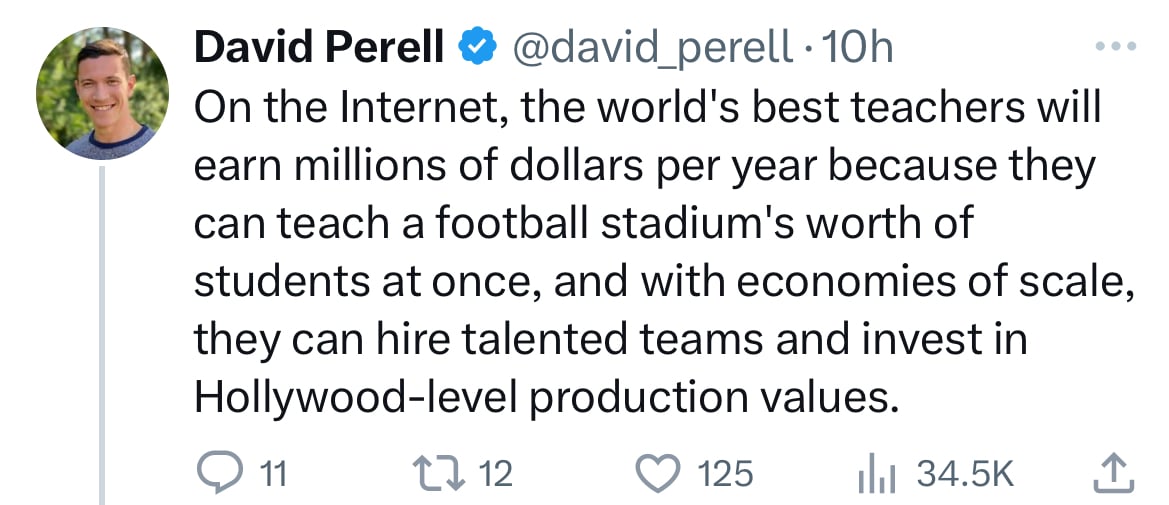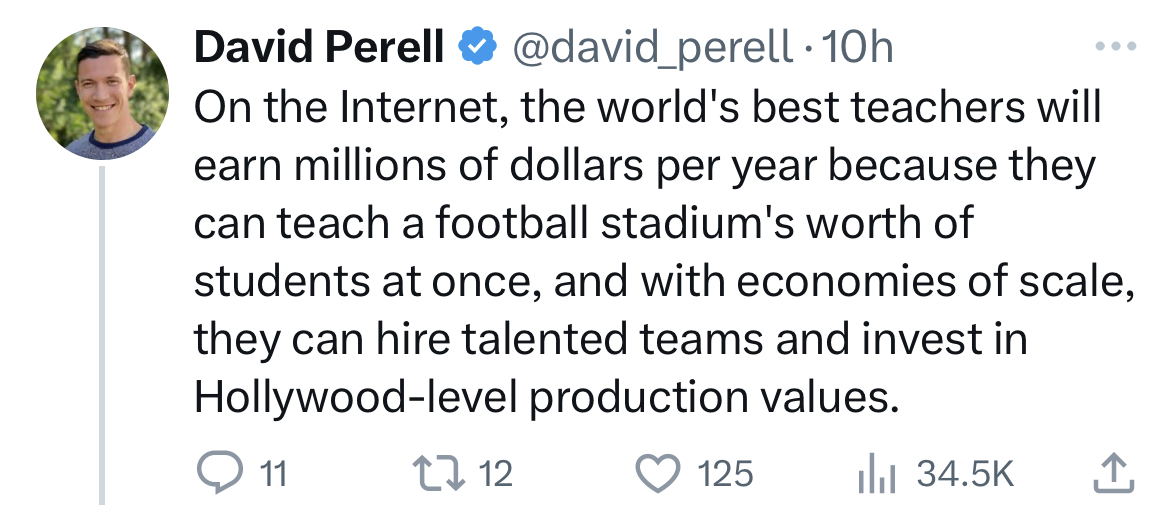Online experiences are the future of learning. Last week, I finished Write of Passage, an online cohort-based writing school, for the fourth time in two years. It’s an intense five week sprint with an incredible community of writers and thinkers. While the content gets revamped each cohort, I come back for the community, the accountability, and the inspiration. I believe that Write of Passage is the future of learning.
Online classes can offer so much more to students than traditional classrooms. In real life, geography limits our access to people and opportunities based on our zip code. The internet has no geographical limitation. It supplies endless experts and opportunities, and maybe most importantly, amplifies affinities and passions so that like-minded pupils can find each other in experiences like Write of Passage.
Technology has improved to the point that anything you can do in a classroom, you can do online for a fraction of the cost. This allows companies like Write of Passage to invest in personnel and presentation to wow students and stimulate their creativity. When you have to pay for roofs, you can’t pay for an army of teachers, presenters, and mentors like Write of Passage can.

I was so jazzed up from this cohort of Write of Passage that when I went off to a 10-day meditation retreat in the middle of the cohort, I often daydreamed about writing and schooling. I wished that Write of Passage could have been substituted for my high school AP English class. I can still remember my AP English teacher telling me on the last day of high school that I could have been a much better writer if I had just committed.
I was dumbfounded.
I had never spent a moment thinking about writing unless I had a 5-paragraph paper due. I was committed to Honor Roll and Basketball. Not writing. I had been writing to get through class and onto the court. Grades earned me basketball sneakers and gym time. No one had ever attempted to convince me that wordplay could rival game day.
As I write this now, I hold my high school in high contempt; how had I spent all that time reading and learning and never realized that writing was worth my attention?
This is my fundamental gripe with schools: they profoundly undersupply inspiration. They focus too much on how and what and never on why.
My daydream catapulted me back to a linoleum floored English class my third year of high school. But instead of a young Dave Shepherd sitting in a student’s seat, I was the gray-haired teacher at the front of the room.
Here’s my pitch, written as a play, to a few high schoolers on the first day of class about the most important skill they could ever learn.
British Literature - First Day of 10th Grade
Dave:
Welcome to British Literature, I’m Dave. [Note: My high school used first names for teachers.]
I want to start off the year by retelling one of my favorite riddles. It comes from the TV show Game of Thrones.
“Three great men sit in a room: a king, a high priest, and a military general. Between them stands a common mercenary for hire. Each great man bids the mercenary kill the other two. Who lives? Who dies?”
Let’s take a vote by a raise of hands. Who thinks the King lives? The High Priest? The General?
[Hands go up.]
Samantha, you voted for the King. How come?
Samantha:
Because the King is the most powerful person in the kingdom and he can order the mercenary to kill the other two.
Dave:
Yes, of course. The King is the most powerful person in the kingdom.
Who voted for the General? Tyrell, why did you vote for the General?
Tyrell:
Because he has a whole army behind him. He’ll just convince the mercenary that if he kills the other two he will protect him and that if he doesn’t the military will hunt him down to avenge the General’s death.
Dave:
Oh, I like that. So the General is the most powerful. Who wants to jump ship and join Tyrell in the General’s camp?
[A few hands go up.]
Ok, now Maria did you vote for the High Priest?
Maria:
Yeah.
Dave:
How come?
Maria:
‘Cause he’ll say that God is on his side and if the mercenary kills the other two, he can do it in the name of god and still go to heaven.
Dave:
Ahh, so you’re saying our mercenary will be swayed with riches in the afterlife. I like that.
Well, we have quite a problem here. We have three great arguments for who is going to live. And it seems the only thing we can all agree upon is, it’s all about who has the most power.
There are good arguments for all three. History has loads of examples of Kings with immense power. Shakespeare wrote many of his plays about real and fictional Kings. We’ll read some Shakespeare this year and see what he thinks of kings. And history is also littered with powerful religious leaders like Mohammed, Jesus, Buddha, and the Pope. And military generals too, like George Washington and Julius Caesar.
If the King is just and a good steward of his kingdom – looking after the people, the economy, and their security – he could easily be the most powerful.
If the priest is a man of god with impeccable faith and also a steward of the people’s spiritual well-being, then he could easily be the most powerful man in the room.
If the General is a commanding leader, noble, and the people feel insecure, he could easily be the most powerful man in the room.
The riddle, however, highlights that if each man could be the most powerful in the room and therefore secure his own freedom, there must be a trick. There must be something hidden in plain sight. What unseen force sways power to the king, the priest, or the general?
Anyone have any idea?
[Silence]
Power is given to whoever the people believe is the most powerful.
And how have the greatest leaders of all time – whether Kings, High Priests, or Generals – secured their power?
Words! Ideas!
“The pen is mightier than the sword.”
It’s also true that the pen is mightier than the crown. And the pen is mightier than the altar.
Abraham Lincoln, while not a king, was the 16th President of the United States of America and galvanized the country with his just cause to liberate all slaves in the United States. His Gettysburg address echoes throughout time.
Four score and seven years ago our fathers brought forth, upon this continent, a new nation, conceived in liberty, and dedicated to the proposition that all men are created equal. Now we are engaged in a great civil war, testing whether that nation, or any nation so conceived, and so dedicated, can long endure.
George Washington was the epitome of a General, both commanding and noble. His Revolutionary War victory over tyranny catapulted him to the Presidency. He was elected the first president of the United States unanimously and he was re-elected unanimously. After two presidential terms, with unprecedented foresight, he stepped down. He voluntarily gave up his power. His farewell address was summarized by the playwright Lee Manuel Miranda in his musical “Hamilton”:
“Though, in reviewing the incidents of my administration, I am unconscious of intentional error, I am nevertheless too sensible of my defects not to think it probable that I may have committed many errors. Whatever they may be, I fervently beseech the Almighty to avert or mitigate the evils to which they may tend. I shall also carry with me the hope that my country will never cease to view them with indulgence; and that, after forty five years of my life dedicated to its service with an upright zeal, the faults of incompetent abilities will be consigned to oblivion....”
Washington’s model of only serving two terms remained intact for almost 150 years despite there not being any law in place to ensure Presidents step down. 30 Presidents in a row followed George Washington’s example laid out in his farewell address.
Reverend Martin Luther King, Jr. captured the nation with his poetical speeches to stomp out racism and heal the nation of its discrimination of blacks. He spoke to a divided nation with the highest morals, devotion, and faith in his fellow citizens.
So even though we face the difficulties of today and tomorrow, I still have a dream. It is a dream deeply rooted in the American dream. I have a dream that one day this nation will rise up and live out the true meaning of its creed: We hold these truths to be self-evident, that all men are created equal.
“All men are created equal” was written in the Declaration of Independence signed by General George Washington. The idea was defended by President Abraham Lincoln. The idea was the bedrock of Reverend Martin Luther King, Jr. and the civil rights movement.
Each of these men are remembered not just because of their deeds but because of their words.
Words can course through generations, they can seep into our blood and infect whole nations and cultures.
Words have power. Ideas have power.
We’re going to read some of the best books ever written and talk about some big ideas that have lasted a long, long time. And each book, each idea, started with someone wielding a pen.
You can be that person. You can pen words and ideas that inspire people to see the world the way you see it. Your ideas written down can transform a person, a classroom, a community, a nation.
That is power. You need not be a king, or a high priest, or a general. You just have to write.
My goal this year is to teach you how to write. To harness words and develop your ideas. To give you power.
Because if you can learn to write, you can do anything. Anything.
And who knows? Perhaps the next Shakespeare or Julius Caesar or George Washington or Abraham Lincoln or Martin Luther King Jr. is sitting in this room right now.
Want to taste the future of learning?
If you're interested in Write of Passage and don't have the means to pay for the course, as an alum I can help you apply for a scholarship. Just reach out.

